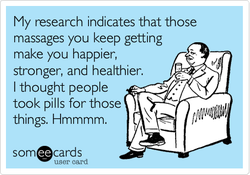 "Be sure to drink plenty of water." "Some soreness may come out in the next couple of days." " Gotta flush out all those toxins." Ever here these things from your massage therapist? I have too. I have said them to many clients as well over the years. But lately, something different has started to come to mind when leaving a new (and regular) client with a to do list after a session. What if what happened after a massage was entirely up to you and your body? Why does relief have to include discomfort? Do you really need to drink plenty of water? Why do things hurt sometimes after a massage? I will try to answer these questions and give a description of what to expect after body work. My clients always ask if they should drink plenty of water. I do think hydration is important, but it is just as important to be hydrated going in to receive a massage as it is to drink water afterward. There is flushing of the tissue that occurs during a massage and drinking plenty of water can help that process. My advice here is to just keep yourself hydrated at all times and you don't have to worry about increasing that after receiving body work. A good rule of thumb is to drink half your body weight in ounces a day. Simply put, if you are 150 pounds, drink at least 75 oz of water a day. Soreness after a massage can be equated to soreness after working out. You are having your muscles manipulated manually and the deeper the massage, the longer the recovery can take. That being said, what you should feel is a tenderness in the tissue, but your movement should easier and more efficient. I also have clients tell me that they feel different sensations for brief periods that they were not expecting. For instance, they came in with a sore low back and after the session had some sort of twinge or soreness afterward in their hip or knee or shoulder, usually only lasting from a short few minutes to a day. This is usually because a change in structure has been made and the body is adapting and realigning itself to the new found freedom. This is a good way to see just how connected everything is and you should discuss these feelings with your therapist the next time you see them. If that soreness lasts longer than 3 or 4 days (in extreme cases) or it starts to turn into a real type of pain, contact your therapist and ask them about it. Many times, underlying issues can start to surface with bodywork and your massage therapist can direct you down the right path for your situation to continue the healing process. Should you drink plenty of water? Yes. Always. Will you be sore? Maybe. It depends on the session and how adapted your body is to the work you are receiving. Finally, if you are ever concerned about anything you are feeling after a session, ask your body what it is requiring. You know your body better than any one else and it will tell you if you are will to listen to the subtleties. You can also ask your therapist or doctor for direction as well! Thanks for reading! Please leave any comments or questions! Nate Ewert, RMT
1 Comment
|
Archives
April 2023
Categories
All
|
Office Phone |
|
Address441 Wadsworth Blvd Ste 206
Lakewood, CO 80226 |
Map |


 RSS Feed
RSS Feed